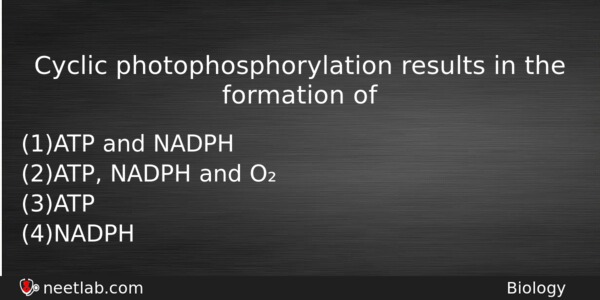| ⇦ | 
| ⇨ |
Cyclic photophosphorylation results in the formation of
Options
(a) ATP and NADPH
(b) ATP, NADPH and O₂
(c) ATP
(d) NADPH
Correct Answer:
ATP
Explanation:
Cyclic photophosphorylation results in the formation of ATP. This process is called photophosphorylation, which occurs in two different ways. Adenosine triphosphate (ATP) is considered by biologists to be the energy currency of life. It is the high-energy molecule that stores the energy we need to do just about everything we do. It is present in the cytoplasm and nucleoplasm of every cell, and essentially all the physiological mechanisms that require energy for operation obtain it directly from the stored ATP.
Related Questions: - Tribe is an independent category between sub-family and
- Four phases of cell cycle are
- Which one of the following is not a part of a renal pelvis?
- The shape of eye lens is changed by
- When a bottle of perfume is placed at one corner of a room and the lid opened
Question Type: Memory
(964)
Difficulty Level: Easy
(1008)
Topics: Photosynthesis and Plant Growth
(26)
Subject: Biology
(4253)
Important MCQs Based on Medical Entrance Examinations To Improve Your NEET Score
- Tribe is an independent category between sub-family and
- Four phases of cell cycle are
- Which one of the following is not a part of a renal pelvis?
- The shape of eye lens is changed by
- When a bottle of perfume is placed at one corner of a room and the lid opened
Question Type: Memory (964)
Difficulty Level: Easy (1008)
Topics: Photosynthesis and Plant Growth (26)
Subject: Biology (4253)
Important MCQs Based on Medical Entrance Examinations To Improve Your NEET Score
18000+ students are using NEETLab to improve their score. What about you?
Solve Previous Year MCQs, Mock Tests, Topicwise Practice Tests, Identify Weak Topics, Formula Flash cards and much more is available in NEETLab Android App to improve your NEET score.
Share this page with your friends

Leave a Reply